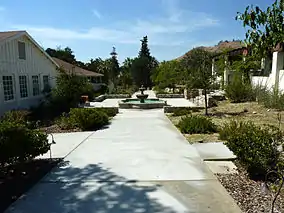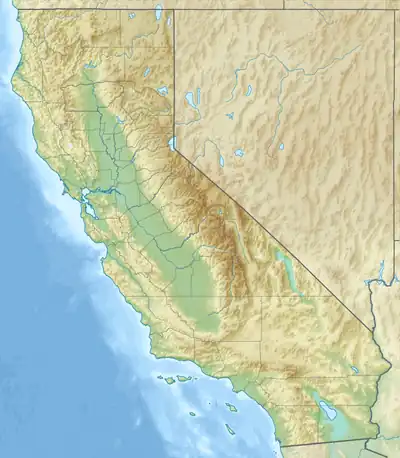| César E. Chávez National Monument (Nuestra Señora Reina de la Paz) | |
|---|---|
IUCN category V (protected landscape/seascape) | |
 The National Chavez Center in Keene, California | |
  | |
| Location | Kern County, California, USA |
| Nearest city | Bakersfield, CA |
| Coordinates | 35°13′38″N 118°33′41″W / 35.2273°N 118.5614°W |
| Area | 116 acres (47 ha)[1] |
| Authorized | October 8, 2012 |
| Visitors | 15,472 (in 2017)[2] |
| Governing body | National Park Service |
| Website | Cesar E. Chavez National Monument |
César E. Chávez National Monument,[3] also known as Nuestra Señora Reina de la Paz, is a 116-acre (47 ha) U.S. National Monument in Keene, Kern County, California, located about 32 miles away from Bakersfield, California. The property was the headquarters of the United Farm Workers (UFW), and home to César Chávez from the early 1970s until his death in 1993. Chávez's gravesite is located in the property's gardens along with that of his wife, Helen Fabela Chávez. Originally developed as a headquarters and worker housing area for a quarry, it served as a tuberculosis sanitarium (known as Stony Brook Sanitorium) in the early 1900s,[3] until its acquisition by the UFW in the early 1970s.
History
Cesar E. Chavez National Monument was established by President Barack Obama on October 8, 2012, by proclamation under authority of the Antiquities Act. The monument is located among the Tehachapi Mountains in Keene, California, about 32 miles (51 km) southeast of Bakersfield. The property is known as Nuestra Señora Reina de la Paz (La Paz), which was designated as a National Historic Landmark along with the monument on October 8, 2012.
The monument is the 398th unit in the National Park System and is managed collaboratively by the National Park Service and the National Chavez Center. The center and members of the Chávez family donated properties of La Paz to the federal government to establish the national monument. Initial funding was provided by the National Park Foundation[4] and the America Latino Heritage Fund.[5] Some of the monument's services and programs are still in development, but a visitor center and memorial garden where Chavez is buried are open to the public.[6][7][8][9] Certain areas of the monument are closed to the public due to the Chávez family still living in La Paz, and members of the UFW still working in the UFW offices located on the property.
Proposed inclusion in national historical park
In October 2013, the National Park Service identified the site as one of several to be part of a proposed new National Historical Park to commemorate the life and work of Cesar Chávez and the farm worker movement.[10] Other sites for the proposed new park include the Filipino Community Hall in Delano, California (headquarters of the Delano grape strike), The Forty Acres (the original UFW headquarters in Delano), McDonnell Hall in San Jose, and the Santa Rita Center in Phoenix, Arizona.[10]
Legislation for redesignation of site was reintroduced in 2023.[11]
See also
References
- ↑ "Listing of acreage – December 31, 2013" (XLSX). Land Resource Division, National Park Service. Retrieved 2014-03-14. (National Park Service Acreage Reports)
- ↑ "NPS Annual Recreation Visits Report". National Park Service. Retrieved 2018-03-28.
- 1 2 "| California State University, Bakersfield". Csub.edu. 2014-02-28. Retrieved 2018-06-05.
- ↑ "National Park Foundation". National Park Foundation. Retrieved 5 June 2018.
- ↑ "American Latino Heritage Fund". National Park Foundation. Archived from the original on 22 June 2018. Retrieved 5 June 2018.
- ↑ "President Obama to Establish César E. Chávez Nat'l Monument". whitehouse.gov. October 1, 2012. Retrieved October 8, 2012 – via National Archives.
- ↑ "César E. Chávez National Monument". National Park Service. Retrieved October 8, 2012.
- ↑ "National Chavez Center". Cesar Chavez Foundation. Retrieved October 8, 2012.
- ↑ "American Latino Heritage Fund Provides $150,000 To Establish The César E. Chávez National Monument". National Park Foundation. Archived from the original on January 17, 2023. Retrieved October 8, 2012.
- 1 2 Burger, James (October 24, 2013). "Kern sites recommended for national park". The Bakersfield Californian. Archived from the original on March 4, 2016. Retrieved 2013-10-26.
- ↑ Silverstein, William (2023-05-23). "National Historical Park proposed for Kern County monuments". KBAK. Retrieved 2023-05-24.